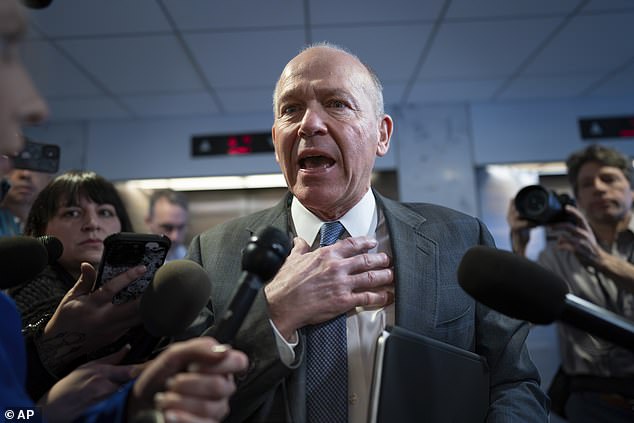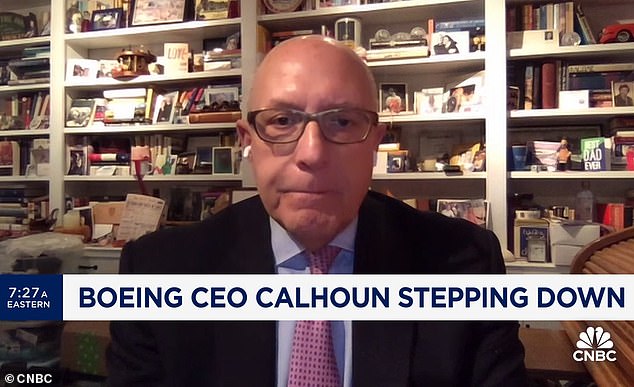Boeing CEO Dave Calhoun’s departure is long overdue and will take too long to effectively avert a spiraling crisis, a prominent business school professor said.
After a series of commercial airliner crashes put Boeing’s manufacturing and safety standards in the spotlight, its chief executive said Monday he would finally resign, but not until the end of the year.
“I think it’s too little, too late,” said Paul Argenti, a professor of corporate communications at Dartmouth’s Tuck School of Business. he told CNBC on Tuesday morning.
Argenti suggested that Calhoun’s slow exit may be indicative of his reluctance to give up the top position. “It still looks like he comes out of the office kicking and screaming,” he said.
“He’ll be there for nine more months, that’s not what I would call a reorganization, it’s a very slow reorganization and I’m curious why it’s taking them so long to do this,” he added.

Boeing CEO Dave Calhoun (pictured Jan. 24) finally said Monday that he would resign, but not for another nine months.


Paul Argenti, a professor of corporate communications at Dartmouth’s Tuck School of Business, said he didn’t understand why Calhoun would take until next year to leave his position.
Argenti suggested that the company’s leadership would need to be “completely rethought” and that righting the ship would be one of the most important management tasks in modern business history.
“This is the most daunting management task we have ever seen,” he said.
‘I can’t think of anything on the same level. Maybe coming back from the financial crisis… but this is a much more complicated situation given that there are problems with current products and (that the new CEO will have to) develop future products.’
“It’s not a job that many people can do.”
A door plug detached from the side of a new Alaska Airlines 737 Max midair during a flight in January. Investigators said bolts that help hold the panel in place were missing after repair work at a Boeing factory.
Federal regulators then placed a limit on 737 production and found a series of problems after an inspection at Boeing facilities.
The Justice Department also opened its criminal investigation into the incident.
Calhoun had been appointed four years ago after Dennis Muilenburg was fired following two crashes that killed nearly 350 people.
Last week, US airline bosses asked to meet with Boeing bosses – without the chief executive present – to express their frustration over the shortage of new planes.
“It really doesn’t bode well that their clients don’t want to talk to the current CEO,” Argenti told CNBC.
“One of the problems I see is that he will not resign until the end of the year and the succession plan is not firmly established,” he said.
The restructuring will also lead to the resignations of Boeing President Larry Kellner and commercial aircraft chief Stan Deal.
Calhoun said yesterday that it had been his decision to resign, telling CNBC: “We have another mountain to climb.”


The 737 Max (pictured) is the plane at the center of Boeing’s growing safety crisis.
Steve Mollenkopf, former head of chipmaker Qualcomm, will replace Kellner and lead the search for Calhoun’s successor.
Chief Operating Officer Stephanie Pope was said to replace Deal, but she is also considered a leading contender to lead the company next year.
But aviation executives have questioned why she would have been assigned to a temporary position if she was going to be the new boss.
‘Is she that person who can lift 170,000 employees and a company in free fall, and one of our country’s most important assets?’ –Argenti asked.
“It’s going to be a very difficult task for anyone who takes on that job.”
Pope was previously chief financial officer of Boeing Global Services, a sign, according to Argenti, that the company was too focused on profits and not quality.
“Even the idea of a CFO, former CFO, becoming COO shows that they are much more financially oriented than quality oriented,” he said.
Last week, the head of the Federal Aviation Administration criticized Boeing for focusing on “production” instead of “safety and quality.”
Administrator Michael Whitaker was not impressed with the aerospace giant after a visit to its facilities.
“My impressions were similar to the culture survey that was just completed at Boeing and our audit, which is that there are issues around the safety culture at Boeing,” he told Lester Holt in NBC Nightly News in a segment that will air Tuesday night.
